Rating: 4.5 out of 5




![]()
In my quest to watch every movie that won the Academy Award for Best Picture, I recently stopped by my school’s library in search of the next film to watch. I searched through the endless shelves of movies in the library, trying to look at the list of movies that won on my phone, I stopped on Gentleman’s Agreement starting Gregory Peck. I just recently watched To Kill a Mockingbird, so I was on my Gregory Peck role for a second. I saw that Gentleman’s Agreement won the Academy Award for Best Picture in 1947, so I obviously had to watch it. I read the back cover and thought it seemed interesting enough. It did win the Academy Award, so many people thought it was good. I went to the front desk and checked out the film, somewhat excited to watch the movie. The one question that went through my head was: what the hell was a gentleman’s agreement? I quickly looked it up (thank you, Wikipedia). A gentleman agreement is an informal and legally non-binding agreement between two or more parties that is typically oral, but can be written, simple handshake and/or nod. Pretty much done on honor and respect between the two parties.
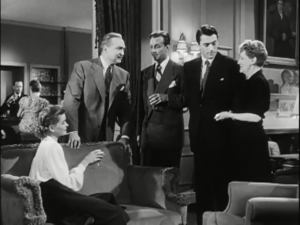
Directed by Elia Kazan and based on Laura Z. Hobson’s best-selling novel of the same name, Gentleman’s Agreement revolves around a journalist who decides to research and write an article that could and would shake the core of many people around him. Philip Green (Peck), is a very well-known and highly respected writer who comes to New York City after being recruited to write a series of articles on anti-Semitism in America. Crazy topic for that time! At first he is not too excited about this assignment because he has no idea how to approach it. While contemplating the story, Green meets and falls in love with Kathy Lacy (McGuire), his publisher’s niece. Green gets the bright idea that he will pretend that he is Jewish and that this will be the only way he could experience the degree of anti-Semitism. At first, everything is fine, but as time goes on, he starts to experience the hatred and prejudice that the Jewish community goes through. This prejudice helps shape a story that will change the way he looks at the world and how his family looks at the world.
After watching this film, I must say that many thoughts went through my head, and I can see why it won the award for Best Picture during its time. Today the concept has probably been done many times in film history. Someone posing as someone else to get a story or to feel how another community feels about something. This actually brings me back to the film, To Kill a Mockingbird that came out a full 15 years after this film. Atticus Finch once stated, “You never really understand a person until you consider things from his point of view until you climb inside of his skin and walk around in it.”
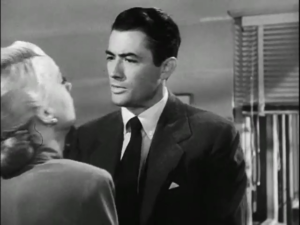
The whole movie is about trying to walk in someone else’s shoes, but the film doesn’t really get to the heart of the issues until the second half of the film. During the first half, Green gets his idea and starts running with it, but it almost seems like the ones closest to him know what he is really doing. Kathy seems to think it’s a cute idea, which in turn tells her sister. Green’s son asks curiously about it, only for him to state that he is playing a role. Even Green’s editor knows and thinks it’s a good idea. It seems like everyone knows and that is where the film starts off so slow because nothing seems like a big deal, but there are subtle hints that things are on the horizon: his doorman objects to his putting a Jewish name on his letterbox in the apartment building and by gossiping with janitors spreads the word about him being Jewish
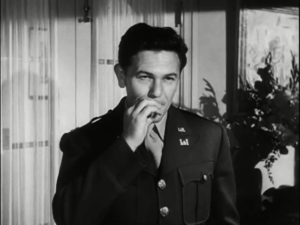
The story really changes when Green’s friend Dave Goldman (Garfield), who is Jewish, moves to New York for a job and lives with the Green family after being in service of the war. Green is very supportive of the idea, but he adds that element of “just wait and see because it’s about to go down” sense. It goes down when he enters the film. When Green and Goldman with some others are at dinner, with Goldman dressed in his military uniform, this is the movie’s first sign of anti-Semitism. Some dude walks over, drunkenly, and asks Goldman his name. This is when he verbally attacks Goldman, who, in turn, reacts a certain way. He should’ve beat that dude’s a**, but he backed off.
From this one scene, the feel of the whole movie changes with all the characters. The relationship between Green and Kathy starts to deteriorate. Kathy comes from an affluent background where her friends and family are discriminative against Jews but don’t believe they are discriminative. Their community and living area is very restrictive to the Jewish people. Things really come to head when Green’s little boy is picked on by the other kids because they think he is Jewish. Green has to calm and talk to his son while Kathy tries her best by trying to make light that it’s not really a big deal because Green is faking. This set of different opinions makes both of them split.
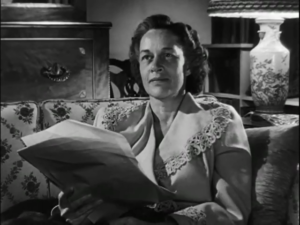
This whole storyline brings everything back to what Atticus stated. You really don’t know what someone goes through until you walk in their shoes. In today’s world, so many things are happening, whether it is women’s rights, police/black relations, offensive pictures being displayed, hateful words, and everything else. We forgot that each and every one of us is a human person. Just though something has changed, it doesn’t mean we’re not the same person. This was beautifully displayed at the end of the film between Green and his secretary Wales (Havoc). When Wales was hired, she believed that Green was Jewish. Wales stated that she is Jewish but changed her name to get a job as her name under her real name was rejected. She is also anti-Semitic when she hears that the editor was going to pass a policy about hiring Jews. She quickly rebuffed the idea because she didn’t want the “wrong Jew” in the workplace. When Green’s article comes out and she learns that Green is not Jewish, she looks like she saw a monster. Yet, Green states that he is still the same person minutes ago, and the only thing that changed was is the word, but everything else is the same. A compelling scene.
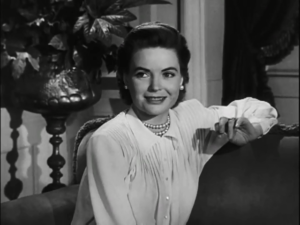
The one fault that this film has is that the viewer never really sees anything related. After watching the movie and being drawn into the film during the last 30 minutes, I sat and thought about it and came to the conclusion that there were ZERO Jewish imagery in the whole film. The film could honestly change what Phil was writing about and replace it with almost any topic and situation.
The cast did an outstanding job overall. Peck, McGuire, Revere were all nominated for the Academy Award in either Best Actor, Best Actress, and Best Supporting Actress. Peck does his thing as the great actor that he is. He brings passion to the role when he is trying to make his point. He always seems to play the calm character that gets mad but does a quite insane. Celeste Holm is outstanding. She won the Academy Award for Best Supporting Actress by playing her role as funny and severe towards the end. To be honest, I actually forgot about her in the whole film as she seemed so secondary yet had a minor presence.
Gentleman’s Agreement is a great movie that lays a fragile foundation on learning about not only anti-Semitism but prejudice and racism overall. The first half of the film is pretty tame, and light as the idea on how to approach the topic comes to light. During the second half of the film, everything comes to a head as everyone’s views are challenged. Gentlemen’s Agreement is a tough and thought-provoking film that anyone will enjoy.